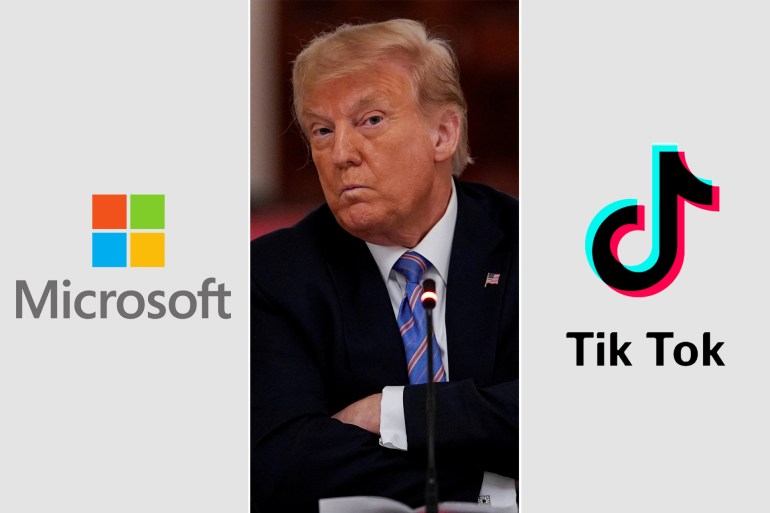US President Donald Trump said on Thursday that the deadline set for the Chinese company, ByteDance, to sell the assets of the popular video app TikTok in the United States will not be extended, and this comes as Chinese technology companies are in trouble with the new Chinese laws. For the technology export abroad.
"There will be no extension of the deadline for Tik Tok ... they will either close it or they sell it," Trump told reporters before leaving for Michigan.
ByteDance had been looking to select a buyer so it could strike a deal by mid-September and comply with Trump's order to liquidate TikTok assets.
The "Tik Tok" application is popular with videos of people dancing, which are spread among teenagers;
But US officials have expressed concern that information about those who use the platform could be transferred to Beijing.
TikTok said it would not comply with any request to share user data with the Chinese authorities.
Republican Senator Josh Hawley - a close Trump ally - told Reuters earlier that he also did not support extending the deadline, and said he did not support an outcome that did not include a full sale.
Reuters reported earlier this month that potential buyers of TikTok were discussing 4 ways to structure a buyout from ByteDance, which includes buying the app's US operations without the main program.
Hawley said, "I am sure that there are a number of back doors included in the code, and of course, byteDance knows what it is exactly, so there must be a clean, clear and complete separation." To enter.
The app filed a lawsuit against the Trump administration in response to what it said was a “highly politicized” executive order. “We prefer constructive dialogue over litigation, but with the executive order threatening to impose a ban on our operations in the United States - which led to "Abolishing the creation of 10,000 American jobs, and irreparably harming the millions of Americans who use this app for entertainment and communication - we simply have no choice."
Byte Dance has been looking to pick a buyer so it can close a deal by mid-September (Al Jazeera + agencies)
The Chinese will prevent the export of their technology
On the other hand, legal experts said that recent additions to China's list of controlled technology exports, announced on August 28, could upset a wide range of industries and increase the likelihood that some global tech giants will be forced to separate their Chinese operations.
The move is initially seen as a way to give Beijing an opinion on any sale of the video app TikTok;
But advisers to Chinese and foreign companies say the potential consequences go much further.
"The rules were surprising to a lot of people in the market, and there is a lot of jitters in technology right now," said Alex Roberts, a corporate consultant at the Linkletters law firm in Shanghai.
In addition to recommendation algorithms such as those used by ByteDance-owned TikTok, the new list includes drone technology, cybersecurity, voice recognition software, and handwriting scanning software.
Companies seeking to export these technologies will be required to pass reviews first, and obtain approvals from the Chinese Ministry of Commerce and the Ministry of Science and Technology.
The reviews could affect a host of multinational companies conducting research and development in China, according to Nicholas Bahmaniar, a cybersecurity consultant at LEAF law firm in Beijing.
"It is very likely that a company that has R&D centers in China will face two options, either to keep its R&D center in China, only for China, or leave the country so that they can use the technology they develop anywhere in the world," Bahmaniyar said.
Lawyers who have taken a close look at the changes say their wide scope means they can reach a wide range of companies across different business sectors.
They gave examples of companies such as Microsoft, the drone manufacturer DJI Technology, and the video broadcasting service Zoom, which has large connections and partnerships in China and outside China.
A source at Tencent, which has a large number of subsidiaries and companies investing abroad, said the company was awaiting clarification on what the new rules for sharing technology with these units mean.
Zoom, for example, employs close to 500 people in China as engineers working on product development, while the Microsoft Research Asia Institute in Beijing is working on a number of research in the field of artificial intelligence.

